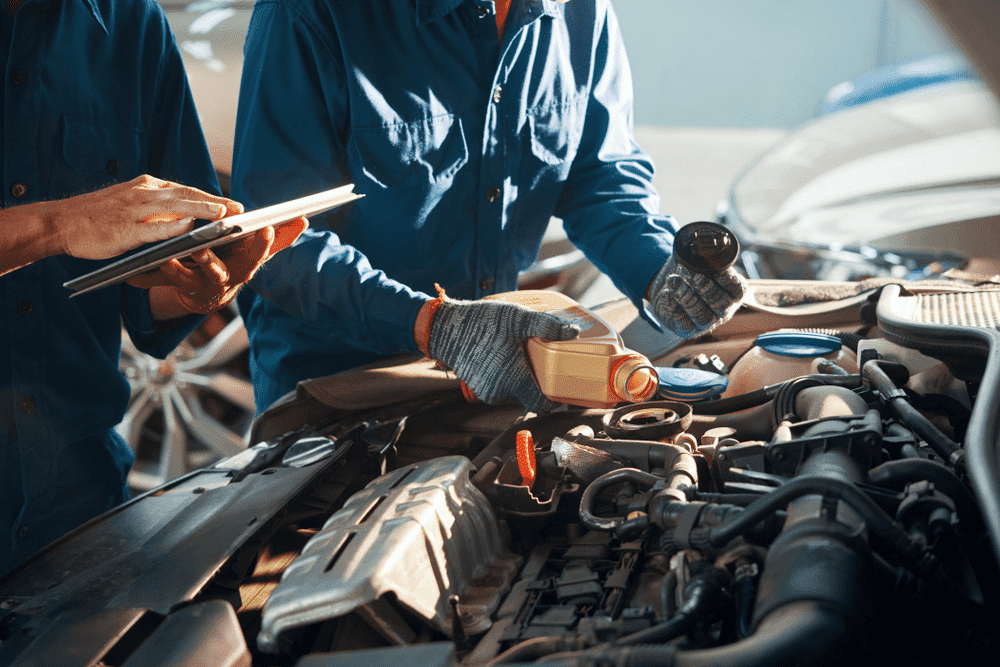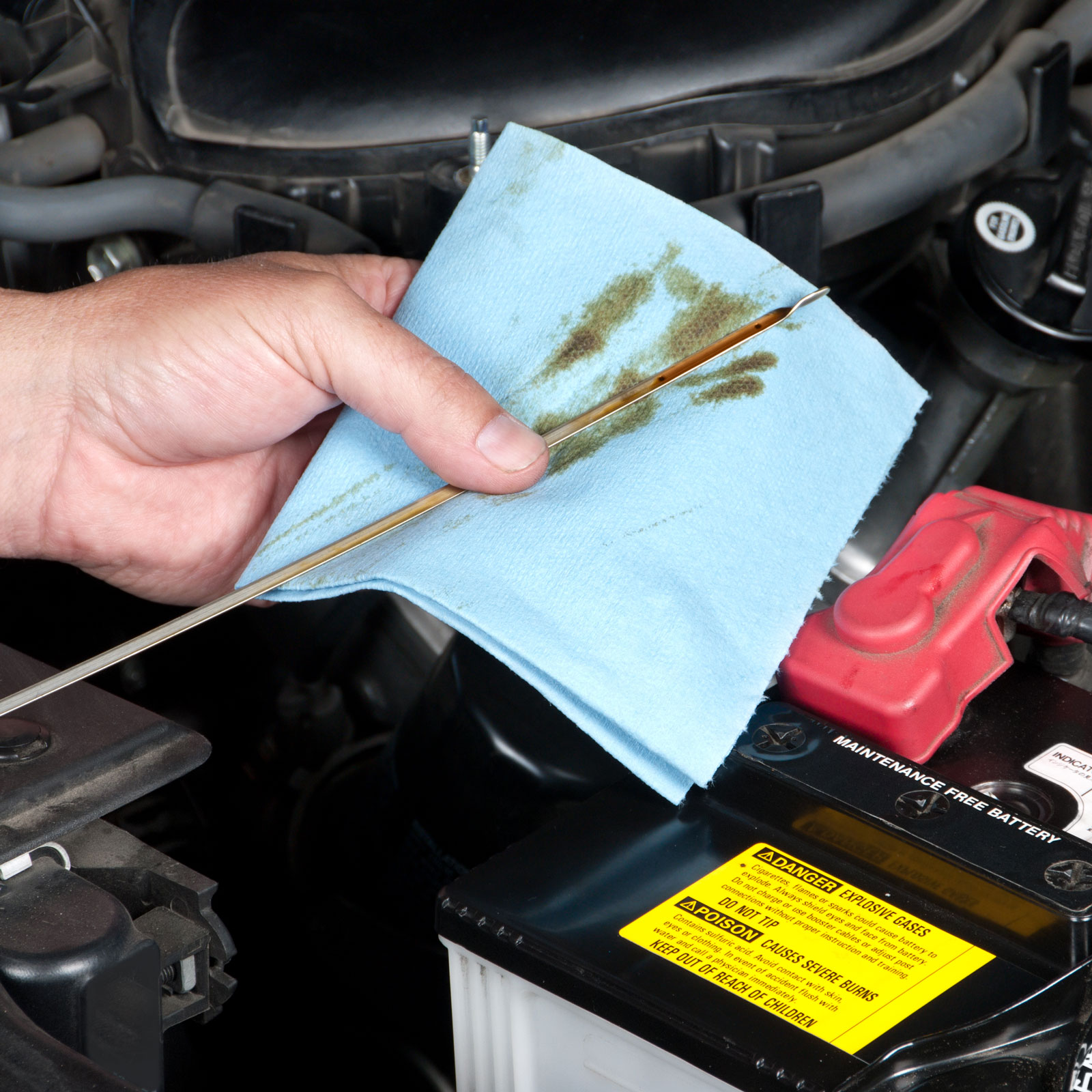When Should You Get an Oil Change?
Posted on April 5, 2021
Should You Trust the Little Sticker?
We all know that little sticker on your windshield that gets an update after you get an oil change. It basically says, 'come in for your next oil change in six months or at around 8000km, whichever comes first'. It may be a little bit anxiety-inducing to think about when you’re nearing the cutoff point. You may start thinking about the consequences of not heeding the instructions on your little sticker. Will your engine seize up? Or will some other horrible consequence come to pass that will lead to more money and headaches down the line if you don’t take care of that oil change immediately? You can also read our blog on how to change an oil.
Well, it helps to understand why you need oil changes in the first place to get a handle on when they need to happen.

Why Do We Need Oil Changes?
Oil naturally breaks down over time and the longer it remains idle, the less viscous it becomes. When it loses its viscosity it becomes less effective at doing its job, which is to keep your engine properly lubricated. There are variants to oil as well. Synthetic oils will break down more slowly than their non-synthetic counterparts but they break down as well, slowly degrading to a sludge that can gum up the works of your engine and potentially come to a point of restricting oil flow or cutting it off entirely.
Now here’s the honest truth: your oil will likely last for a pretty long time before fully degrading. The real reason that you need an oil change is not necessarily degradation, it’s contaminants. Moisture is a major problem. If there’s moisture in your oil it won’t lubricate your engine as it should and it will eventually lead to a shorter engine life for your vehicle.
What Kind of Oil Should You Use?
Every car needs oil but the specific oil that your car needs will vary from vehicle to vehicle. Modern engines are created to specific standards that meet car manufacturer specifications to ensure that your vehicle maintains a long life in perfect working order. Also, it’s worth noting that if you don’t use the right type of oil and keep a record of its use your new-car warranty could become void.
Most cars from the recent past require a synthetic blend or a full synthetic, multi-grade variation. Synthetic oils are designed to add to fuel economy and lubrication for your engine but choosing the right one for your vehicle is important.
Oils are labelled with SAE ratings for their viscosity grade and these need to comply with any specifications established by the car and engine manufacturer. You can find these requirements detailed clearly within the owner’s manual. If you’re unsure, a certified CarHub technician will be able to tell you your vehicle’s recommended oil type and make sure that you use the proper one.
How Often Should You Get An Oil Change?
Well, it should be pretty straightforward but the question has a multi-faceted answer. Just what you wanted to hear, right??
The older your vehicle becomes, the more oil changes have a bearing on their performance. Older cars will typically have oil recommendations that are based on mileage. They will also come with two distinctive maintenance schedules that fall under the classification of ‘normal’ operation and ‘severe service’ operation. Severe service is a foreboding sounding term but the truth is that it doesn’t add up to much in terms of the actual service that is put on a vehicle. If your car is tasked with doing its job in extremely hot, cold or dusty conditions or if it is made to carry heavy loads or tow a trailer, it could fall under the banner of severe service.
If you are using your vehicle in a severe service condition, it would be in your best interest to keep the oil change schedule both regular and rigorous.
Spoiler alert: if you live in Canada, you will more than likely spend some time driving in severe conditions throughout the year!
Luckily, most cars now come equipped with oil-life monitoring systems that will automatically determine for you when an oil change is necessary and let you know via your vehicle’s notification panel. The more advanced your vehicle is, the more likely to use its systems to analyze the oil itself and your car’s operating conditions to identify when your oil has begun to degrade. If that’s the case, you may not see any severe operation warnings in your owner’s manual because your car is taking care of monitoring that for you: it will actually shorten the recommended oil change interval when it detects heavy-duty operation on your vehicle.
You know what that means, right? That means that little light on the dash that you’d love to ignore is worth paying attention to. When it comes on a certified CarHub technician will be able to assess the problem for you and fix it as needed. They’ll even reset the system for you and make sure that that pesky light gets turned off! Nothing can ruin peace of mind on a nice drive than a light flashing from your notification centre so it’s good to have those taken care of when they come on.

Why Your Driving Habits Matter
The way that you drive your car has a direct impact on the way that your car’s oil is consumed. Do you usually take short burst trips? Or are you a highway driver? It may seem counterintuitive but short trips are harder on your engine than long ones. Long trips at high, constant speeds help your engine to boil off the condensation that builds up in the system. Moisture is arguably oil’s biggest pain point so boiling off condensation helps keep your oil clean and high-functioning.
Short burst drives also put a strain on your engine because the largest culprit for wear and tear on an engine comes from firing your car up. People who make frequent stops generally put more abuse on their engine but frequent oil changes will help alleviate the stress that your engine is under.
In recent years, fuel consumption and emissions concerns have made stop-start engines a normal feature of many vehicles. Yes, this does affect your oil quality and yes, you should increase your oil maintenance schedule as a result.
Engine Wear and Tear
While there have been many improvements to motor oil in the past few years, engines face new stresses that place huge demands on oil.
Newer cars have been manufactured in accordance with trends that have seen a decrease in the size of oil filters, smaller compartments for engines and higher horsepower.
All of this amounts to massive strain on your engine and contributes greatly to lowering your engine life. That’s why there have been growing calls from service technicians in the past few years to be more vigilant in oil change schedules than car manufacturers recommend. The recommended intervals are not enough to keep oil filters from becoming excessively dirty and allowing contaminants to sully otherwise fresh oil.

What Can You Do About It?
A CarHub certified technician will be able to take a full assessment about the health of your engine and oil but there are some ways that you can remain proactive in ensuring that your engine maintains a high degree of effectiveness.
One thing that CarHub recommends is getting in a habit of checking your oil as frequently as once a month to make sure that your car is not burning or leaking oil. One way to tell if your oil is healthy is by colour: good oil should be a clear brown colour. If the oil is opaque your oil is not in its premium state and could use an update. If it’s cloudy, it could be a signal of something more serious: your engine coolant could be leaking. One thing to note: diesel oil’s natural state is a deep black so rest assured that your diesel oil is healthy if it’s that colour!
There’s one way to easily check how your oil is doing: use the dipstick. Nothing beats checking the dipstick to see how your vehicle is performing and how your driving habits are affecting your oil consumption. To do this properly, make sure that your car is resting on a flat service and that the engine is cold. You’ll also know if your oil needs to be topped off because even new cars can burn oil at a high rate or be subject to contamination. Once you get used to checking it monthly it will become almost second nature. Of course, if you have doubts the CarHub service team will be happy to take that job out of your hands and do a service assessment for you.
You can put all of your oil-change worries aside and make an appointment today to have a full-service checkup completed by a CarHub service technician!
